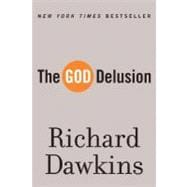
Note: Supplemental materials are not guaranteed with Rental or Used book purchases.
Purchase Benefits
What is included with this book?
| Preface to the paperback edition | p. 13 |
| Preface | p. 23 |
| A Deeply Religious Non-Believer | p. 31 |
| Deserved respect | p. 31 |
| Undeserved respect | p. 41 |
| The God Hypothesis | p. 51 |
| Polytheism | p. 52 |
| Monotheism | p. 58 |
| Secularism, the Founding Fathers and the religion of America | p. 60 |
| The poverty of agnosticism | p. 69 |
| NOMA | p. 77 |
| The Great Prayer Experiment | p. 85 |
| The Neville Chamberlain school of evolutionists | p. 90 |
| Little green men | p. 94 |
| Arguments for God's Existence | p. 100 |
| Thomas Aquinas' 'proofs' | p. 100 |
| The ontological argument and other a priori arguments | p. 103 |
| The argument from beauty | p. 110 |
| The argument from personal 'experience' | p. 112 |
| The argument from scripture | p. 117 |
| The argument from admired religious scientists | p. 123 |
| Pascal's Wager | p. 130 |
| Bayesian arguments | p. 132 |
| Why There Almost Certainly is No God | p. 137 |
| The Ultimate Boeing 747 | p. 137 |
| Natural selection as a consciousness-raiser | p. 139 |
| Irreducible complexity | p. 144 |
| The worship of gaps | p. 151 |
| The anthropic principle: planetary version | p. 162 |
| The anthropic principle: cosmological version | p. 169 |
| An interlude at Cambridge | p. 180 |
| The Roots of Religion | p. 190 |
| The Darwinian imperative | p. 190 |
| Direct advantages of religion | p. 194 |
| Group selection | p. 198 |
| Religion as a by-product of something else | p. 200 |
| Psychologically primed for religion | p. 208 |
| Tread softly, because you tread on my memes | p. 222 |
| Cargo cults | p. 234 |
| The Roots of Morality: Why are We Good? | p. 241 |
| Does our moral sense have a Darwinian origin? | p. 245 |
| A case study in the roots of morality | p. 254 |
| If there is no God, why be good? | p. 259 |
| The 'Good' Book and the Changing Moral Zeitgeist | p. 268 |
| The Old Testament | p. 269 |
| Is the New Testament any better? | p. 283 |
| Love thy neighbour | p. 288 |
| The moral Zeitgeist | p. 298 |
| What about Hitler and Stalin? Weren't they atheists? | p. 308 |
| What's Wrong with Religion? Why Be So Hostile? | p. 317 |
| Fundamentalism and the subversion of science | p. 319 |
| The dark side of absolutism | p. 323 |
| Faith and homosexuality | p. 326 |
| Faith and the sanctity of human life | p. 329 |
| The Great Beethoven Fallacy | p. 337 |
| How 'moderation' in faith fosters fanaticism | p. 341 |
| Childhood, Abuse and the Escape from Religion | p. 349 |
| Physical and mental abuse | p. 354 |
| In defence of children | p. 366 |
| An educational scandal | p. 372 |
| Consciousness-raising again | p. 379 |
| Religious education as a part of literary culture | p. 383 |
| A Much Needed Gap? | p. 388 |
| Binker | p. 389 |
| Consolation | p. 394 |
| Inspiration | p. 404 |
| The mother of all burkas | p. 405 |
| A partial list of friendly addresses, for individuals needing support in escaping from religion | p. 421 |
| Books cited or recommended | p. 427 |
| Notes | p. 436 |
| Index | p. 449 |
| Table of Contents provided by Ingram. All Rights Reserved. |
The New copy of this book will include any supplemental materials advertised. Please check the title of the book to determine if it should include any access cards, study guides, lab manuals, CDs, etc.
The Used, Rental and eBook copies of this book are not guaranteed to include any supplemental materials. Typically, only the book itself is included. This is true even if the title states it includes any access cards, study guides, lab manuals, CDs, etc.